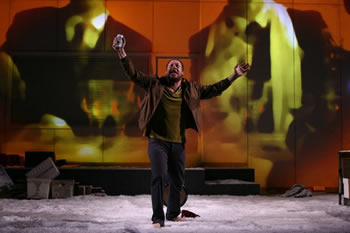HotReview.org Editor's
Picks
Shows Worth Seeing:

Notes from Underground
Adapted from Dostoyevsky's novel
by Bill Camp and Robert Woodruff
Baryshnikov Arts Center
450 W. 37th St.
Box office: (212) 868-4444
This stage adaptation of Dostoyevsky’s landmark
novel is slow getting started, but once it gathers steam it becomes
surprisingly powerful. The remarkable actor Bill Camp, grizzled,
pudgy and unkempt, is the poisonously anti-social ex-civil servant
who narrates the book, portrayed as a geeky modern-day shut-in
raking over old wounds and grievances in an institutional-flavored
apartment with the help of a video-cam and computer (presumably
with wi-fi hookup). As Camp speaks into the hand-held cam, his
face is projected upstage, and that’s about all that happens
for a half hour or so. During this section, I whispered to my
companion that I would have to leave if nothing else happened
soon to theatricalize the book’s relentlessly introspective
text. Thankfully, Camp began to engage more with his surroundings,
bringing the mise en scène actively into the action.
Two other performers, Michael Attias and Merritt Janson, provide
subtle musical accompaniment while lurking at the sides, and Janson
gives a terrific, icily brittle performance as Liza, the prostitute
whom the underground man sleeps with, comforts and then humiliates.
Sleekly stylized videos of fragmented and faceless people add
vivid texture to Camp’s enactment of a horribly misfired
dinner with quasi-friends from his past, and he eventually becomes
an intensely compelling physical presence in his own right while
lounging, tiptoeing, crawling and moping about the installation-like
setting. The ramshackle room, designed by David Zinn, is strewn
with shabby, overturned furniture, dumped out files, and a ubiquitous
layer of artificial snow. The first part of Dostoyevsky’s
book, exclusively devoted to description of the narrator’s
mental state, is so static that I suspect no one could effectively
theatricalize it. Once this production gets to the second part,
though, which contains actual events, it acquires momentum, heat
and humor. At its best, it fuses Camp’s specter of a self-obsessed,
info-age recluse so closely with Dostoyevsky’s prophetic
proto-modern nihilist that the parallel is chilling.
